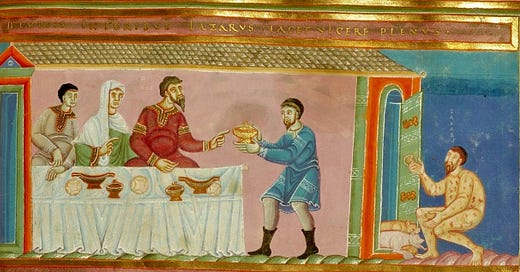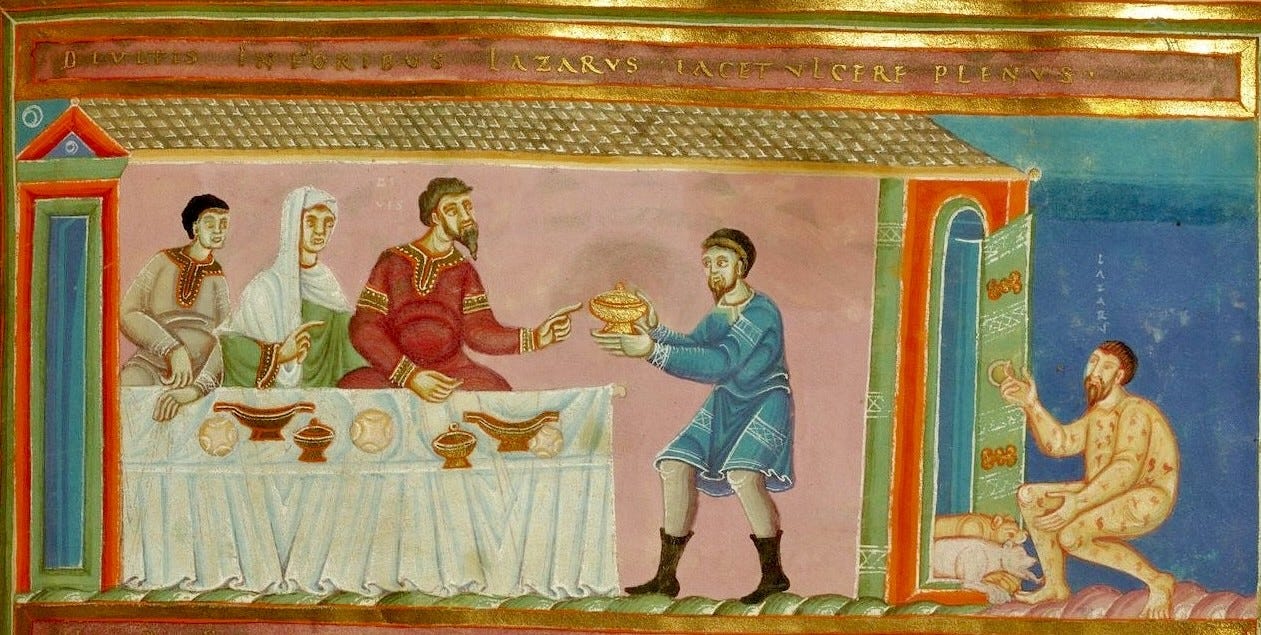This story by Michael Merrick addresses the estrangement between the Church and working class communities, calling the Church to an examination of conscience.
Here is a question we must ask ourselves, however uncomfortable: who today is our Lazarus at the gates?
In a society of fraying of social bonds and huge social change, the parable of the Good Samaritan holds a particular power. It gives a clear steer through the noise, a useful host-group reminder: welcome the stranger, care for those in need, especially those fleeing famine, or war or tragedy.
And hear hear to that – we are each of us called to acts of welcome, of care, of pursuit of the good of the other - whomever that happens to be. There can be no shirking this responsibility, and we do well to be reminded of it, as Bishop McAleenan has done recently.
Of course one could ask whether there are more sophisticated readings of the Good Samaritan, ones that avoid the risk of turning the Church into a secular NGO, a sort of quango social activism that may lean on a Bible quote now and again but not much else. But the point remains that it is a powerful call on our conscience. And for that reason it is well put to work, particularly in our schools, as we in the Catholic community do our bit to help strengthen the changing society before us, to mitigate and soothe the tensions it has fostered.
Now, a segue: the uncomfortable memory of the riots have not really gone away. Something changed during those days. It is not that we were a peaceful country before them, but their impact has changed the social contract somehow. The previously unthinkable, the unsayable, has become mainstream. The frustrations have bubbled over and they are not going away - the world has become an uglier place.
I remember watching the news broadcasts on those days, horrified, frustrated, angry. Watching the cast of the apprehended, their mugshots and names flashing before us, and I felt a profound sadness.
I couldn’t shake the feeling that these were my people, the folk I grew up with, who I was proud to grow up with. In a way, if more through family than friendships these days, they still are.
And call me a smug patrician, but as you looked at these faces, and heard these names - such familiar names - I could not help but feel that we, the Church, have failed in our duty toward them. We have not been there for them. Worse thing still, we might even at times have joined in the kicking.
Within living memory, the affiliation between the working class and Catholic churches and parishes up and down the land was rock solid. Within living memory, these people would have been at Mass. Within living memory, these men and women stood in our churches, drank in our social clubs, called their priest in times of crisis, put their kids in our schools, played for our sports teams, went through baptism, first communion, confirmation, marriage, death.
I don’t think we are that same Church anymore.
What changed? Perhaps they did. Perhaps we did. Most likely, some mixture of both. But however we divide the blame, it remains true that we are distant from people like these – from communities like these – in heart if not geography.
We no longer share their experiences. We no longer speak to their concerns. Worse, it can feel that we, like everyone else who despises them, not only dismiss their concerns but work hard to tell them why they’re wrong. We have made a space for all in our churches – and all to the good – but have we made a space for these? Have we shared their tears, their tragedies, have we called attention to their plight?
These are the social outcasts of today. And we have become respectable. It is not a good mix.
Which is why I wonder if, for all our focus on the good Samaritan, perhaps we could do with reminding ourselves of the story of the rich man and Lazarus.
The point of Lazarus at the gates was not that he was a stranger, but that he was known. Not that he was a one-off encounter at the roadside, but that he was stepped over, day after day, by people in his own place.
The parable of Lazarus is not of the compassionate stranger and his extraordinary kindness, paying for board and lodging for a stranger in need, but instead the man despised at the very gates of the house he is not allowed to enter into. And as he cried for the crumbs from the rich man's table, he was desperate in his lowliness – so lowly, so much the outcast, that only the dogs would attend to him.
Lazarus challenges us not because he is a call for an out-of-the-ordinary act of caritas for someone we don’t know, but because he demands an ongoing act of love for someone we do. He demands that we hear him, that we see him, in all his suffering, there at our gates, that we care and that we act - and the consequences of us not doing so are eternal.
We must ask: who is the Lazarus at the gates today? Who are the social outcasts, the untouchables, the ones stepped over? Who are the those who call us into conflict against our sense of respectability, our pride, against the smallness of our love?
I propose that they are there, in a great many communities, wracked with anxiety and fear and anger, and feeling increasingly mutinous. I propose that they feel abandoned, and despised, stepped over, and ignored. I propose that our call to social action has too often glossed over the hurt and wounded in these communities. I propose that we have been guilty partners in that abandonment.
And that our flight has been a disaster for those people.
19 “There was a rich man who was dressed in purple and fine linen and lived in luxury every day. 20 At his gate was laid a beggar named Lazarus, covered with sores 21 and longing to eat what fell from the rich man’s table. Even the dogs came and licked his sores.
Michael Merrick
Michael Merrick is Diocesan Schools Commissioner at the Diocese of Lancaster.
He can be found on X.com at @michael_merrick where he describes himself as Northern. Catholic. Father of 7. Ad Majorem Dei Gloriam.
Header image: The Master of the Codex Aureus of Ecternach, The Parable of Lazarus and the Rich Man From the Golden Gospels of Echternach German (Echternach), c. 1030 Nuremberg, Germanisches Nationalmuseum MS Hs 156142, fol. 78




